Jaguar F-Pace vs Toyota C-HR – Differences & prices compared
Compare performance, boot space, consumption and price in one view.
Find out now: which car is the better choice for you – Jaguar F-Pace or Toyota C-HR?
The Jaguar F-Pace (SUV) comes with a Diesel MHEV, Petrol MHEV, Plugin Hybrid or Petrol engine and Automatic transmission. In comparison, the Toyota C-HR (SUV) features a Full Hybrid or Plugin Hybrid engine with Automatic transmission.
When it comes to boot capacity, the Jaguar F-Pace offers 470 L, while the Toyota C-HR provides 447 L – depending on how much space you need. If you’re looking for more power, decide whether the 575 HP of the Jaguar F-Pace or the 223 HP of the Toyota C-HR suits your needs better.
In terms of consumption, the values are 1.80 L per 100 km for the Jaguar F-Pace, and 0.80 L for the Toyota C-HR.
Price-wise, the Jaguar F-Pace starts at 56400 £, while the Toyota C-HR is available from 29100 £. Compare all the details and find out which model fits your lifestyle best!
Jaguar F-Pace
The Jaguar F-Pace effortlessly combines luxury and performance, offering an exceptional driving experience. Its sleek design is complemented by a refined interior that ensures comfort even on the longest journeys. With advanced technology features, the F-Pace remains at the forefront of innovation, making it a standout choice in the SUV segment.
details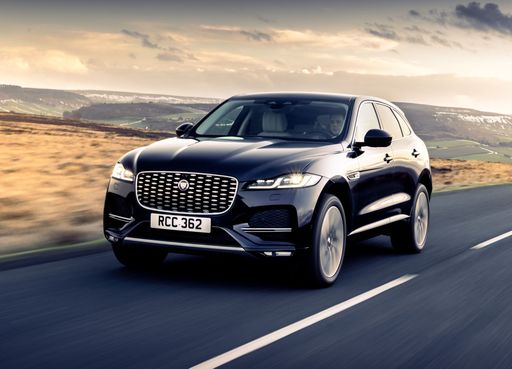 @ media.jaguar.com
@ media.jaguar.com
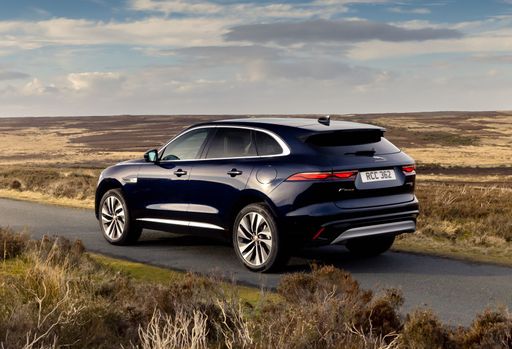 @ media.jaguar.com
@ media.jaguar.com
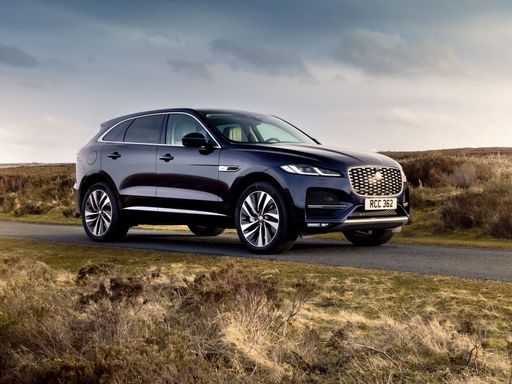 @ media.jaguar.com
@ media.jaguar.com
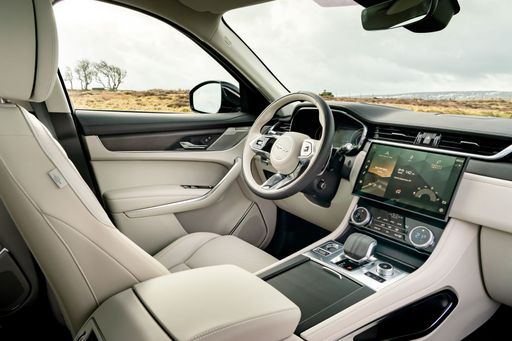 @ media.jaguar.com
@ media.jaguar.com
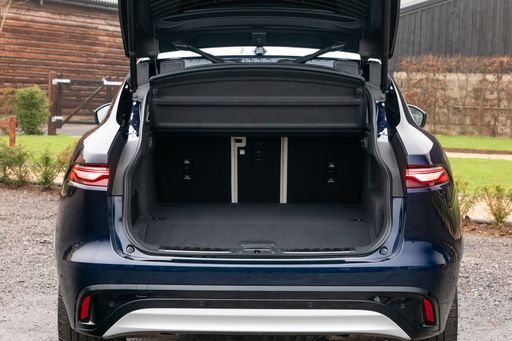 @ media.jaguar.com
@ media.jaguar.com
Toyota C-HR
The Toyota C-HR stands out with its distinctive and bold design that combines sleek, angular lines with a sporty posture. Its comfortable and stylish interior is equipped with advanced technology features, providing a seamless driving experience. The vehicle offers impressive handling and performance, making it a compelling choice for those who appreciate a blend of practicality and flair on the road.
details @ Toyota
@ Toyota
 @ Toyota
@ Toyota
 @ Toyota
@ Toyota
 @ Toyota
@ Toyota
 @ Toyota
@ Toyota

|

|
|
|
|
Costs and Consumption |
|
|---|---|
|
Price
56400 - 100800 £
|
Price
29100 - 42800 £
|
|
Consumption L/100km
1.8 - 12 L
|
Consumption L/100km
0.8 - 5.1 L
|
|
Consumption kWh/100km
-
|
Consumption kWh/100km
-
|
|
Electric Range
64 km
|
Electric Range
68 km
|
|
Battery Capacity
15.40 kWh
|
Battery Capacity
-
|
|
co2
41 - 274 g/km
|
co2
17 - 115 g/km
|
|
Fuel tank capacity
62 - 83 L
|
Fuel tank capacity
43 L
|
Dimensions and Body |
|
|---|---|
|
Body Type
SUV
|
Body Type
SUV
|
|
Seats
5
|
Seats
5
|
|
Doors
5
|
Doors
5
|
|
Curb weight
1951 - 2230 kg
|
Curb weight
1505 - 1755 kg
|
|
Trunk capacity
354 - 470 L
|
Trunk capacity
350 - 447 L
|
|
Length
4747 - 4762 mm
|
Length
4362 mm
|
|
Width
1936 mm
|
Width
1832 mm
|
|
Height
1664 - 1670 mm
|
Height
1558 - 1564 mm
|
|
Payload
457 - 589 kg
|
Payload
375 - 425 kg
|
Engine and Performance |
|
|---|---|
|
Engine Type
Diesel MHEV, Petrol MHEV, Plugin Hybrid, Petrol
|
Engine Type
Full Hybrid, Plugin Hybrid
|
|
Transmission
Automatic
|
Transmission
Automatic
|
|
Transmission Detail
Automatic Gearbox
|
Transmission Detail
CVT
|
|
Drive Type
All-Wheel Drive
|
Drive Type
Front-Wheel Drive, All-Wheel Drive
|
|
Power HP
163 - 575 HP
|
Power HP
140 - 223 HP
|
|
Acceleration 0-100km/h
4 - 10.1 s
|
Acceleration 0-100km/h
7.4 - 9.9 s
|
|
Max Speed
195 - 286 km/h
|
Max Speed
175 - 180 km/h
|
|
Torque
380 - 700 Nm
|
Torque
-
|
|
Number of Cylinders
4 - 8
|
Number of Cylinders
4
|
|
Power kW
120 - 423 kW
|
Power kW
103 - 164 kW
|
|
Engine capacity
1997 - 5000 cm3
|
Engine capacity
1798 - 1987 cm3
|
General |
|
|---|---|
|
Model Year
2024
|
Model Year
2024 - 2025
|
|
CO2 Efficiency Class
G, B
|
CO2 Efficiency Class
C, B
|
|
Brand
Jaguar
|
Brand
Toyota
|
Jaguar F-Pace
Unveiling the Jaguar F-Pace: A Blend of Power and Sophistication
The Jaguar F-Pace represents the perfect amalgamation of luxury and performance, encapsulating the essence of a modern SUV. Crafted with precision, the F-Pace offers a unique driving experience backed by innovative technology and robust engineering.
Engineering Excellence: Performance and Power
At the heart of the Jaguar F-Pace lies a diverse lineup of engines: from fuel-efficient diesel mild hybrids to potent petrol engines, and even a state-of-the-art plug-in hybrid option. The engine power ranges from a solid 163 PS in the entry-level model to an exhilarating 575 PS in the top-tier variant, ensuring that there is a F-Pace suitable for every performance preference.
Coupled with an automatic transmission and all-wheel drive, the F-Pace guarantees seamless power delivery and exceptional handling across various terrains. Its acceleration prowess varies from 0-100 km/h in as quick as 4 seconds, providing thrilling performance for the avid driver.
Innovative Green Technology
Jaguar ensures the F-Pace aligns with modern sustainability needs by incorporating a plug-in hybrid model that achieves remarkable efficiency. With a consumption rate of merely 1.8 L/100km and an electric range of up to 64 km, the P400e model reduces the carbon footprint while maintaining the luxury and performance synonymous with Jaguar.
The mild hybrid technology integrated into several models reduces emissions and improves fuel efficiency, solidifying the F-Pace's commitment to eco-friendly innovation.
Luxurious Interior and Cutting-edge Features
Inside the F-Pace, luxury takes centre stage. The cabin is adorned with high-quality materials and the latest infotainment systems, ensuring a comfortable and connected journey. The SUV's spacious interior, accommodating up to five passengers, offers ample room for both occupants and luggage, with a minimum boot capacity of 354 litres.
Advanced technological features enhance the F-Pace's appeal, with options for personalized electronic settings and premium audio systems, making every journey as enjoyable as possible.
Safety and Technology Integration
The Jaguar F-Pace is equipped with advanced safety technologies that provide peace of mind for all passengers. Features such as adaptive cruise control, lane-keeping assist, and parking assistance exemplify its commitment to protecting drivers and passengers alike.
Beyond safety, the infotainment system offers seamless connectivity, with options for navigation, media streaming, and smartphone integration, ensuring the F-Pace is both a sanctuary and a mobile office.
Conclusion: The Epitome of Modern Luxury SUVs
The Jaguar F-Pace symbolizes a dedication to engineering prowess and luxurious design, all while embracing modern advancements in eco-friendly technology. Whether cruising on a city road or adventuring off the beaten path, the F-Pace delivers a driving experience that is both exhilarating and refined. For those in pursuit of a blend of performance, luxury, and innovative technology, the F-Pace stands as an exemplary choice.
Toyota C-HR
Revolutionising the Crossover Segment: The Toyota C-HR
The Toyota C-HR has firmly established itself as a standout contender in the compact crossover segment. Known for its distinct design and hybrid capabilities, the C-HR continues to prioritise innovation and efficiency. In this article, we delve into the technical details that make the 2024 iteration a compelling choice for discerning buyers.
Distinctive Design and Aerodynamics
The Toyota C-HR boasts a striking design that combines angular lines with modern aesthetics. This isn't merely for show; the design enhances aerodynamics, improving fuel efficiency and handling. With dimensions of 4362mm in length and a sophisticated structure, the C-HR strikes a balance between urban agility and on-road stability.
Impressive Hybrid Powertrains
The C-HR lineup offers innovative hybrid and plug-in hybrid drivetrain options. The full hybrid system is tailored for those who seek both economic and environmental benefits. It combines a petrol engine with an electric motor to deliver power outputs ranging from 140 to 223 PS, achieving remarkable fuel consumption rates from 0.8 to 5.1 L/100km. The 2.0 Plug-In Hybrid variant impresses with an electric range of 67 km, ideal for urban commuters.
Unmatched Efficiency and Performance
Acceleration figures for the C-HR range from 7.4 to 9.9 seconds to reach 0-100 km/h, ensuring a responsive driving experience. Maximum speeds between 175 and 180 km/h cater to those who appreciate a bit of zest on the open road. Coupled with CVT automatic transmission and both front-wheel and all-wheel-drive configurations, the C-HR adapts to various driving conditions with ease.
Advanced Technology and Features
Inside, the C-HR is equipped with the latest technology aimed at providing connectivity and comfort. The model hosts an array of features across its diverse trim levels, including Business Edition, Lounge, and the sporty GR SPORT. Each variant is designed to meet the demands of different lifestyles, ensuring there's a C-HR model to suit every taste.
Sustainability and Cost Efficiency
With CO2 emissions ranging from 19 to 115 g/km, the C-HR stands as a testament to Toyota's commitment to sustainability. Financially savvy consumers will also appreciate the running cost, with monthly expenses from €959 to €1204, and a cost per km as low as 38.4 cents. Such efficiency makes the vehicle an attractive option for eco-minded buyers.
Conclusion: A Forward-Thinking Choice
The 2024 Toyota C-HR embodies Toyota's forward-thinking approach to automotive innovation, blending eco-friendly hybrid technologies with stylish design and practicality. It offers a glimpse into the future of driving, where efficiency meets elegance. Whether you're a city dweller or an adventure seeker, the C-HR promises a driving experience that is both enjoyable and environmentally conscious.
Which drive types are available for the Jaguar F-Pace?
Available as All-Wheel Drive.
The prices and data displayed are estimates based on German list prices and may vary by country. This information is not legally binding.
